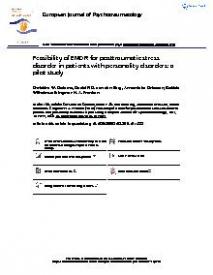Feasibility of EMDR for posttraumatic stress disorder in patients with personality disorders : a pilot study
Background: Trauma and posttraumatic stress disorder (PTSD) are prevalent in patients with personality disorders. Despite the established efficacy of eye movement desensitisation and reprocessing (EMDR) for PTSD, EMDR has barely been examined in patients with comorbid PTSD and personality disorders.
Objective: The aim of this study was to explore what changes occur in symptom severity of PTSD, dissociative symptoms, insomnia, non-suicidal self-injurious behaviour and auditory verbal hallucinations in patients with personality disorders during treatment with EMDR.
Method: This uncontrolled open feasibility study on EMDR for PTSD was an addition to treatment-as-usual for personality disorders. The outcome measures were the severity of PTSD symptoms, dissociation, insomnia, non-suicidal self-injury, and auditory verbal hallucinations.
Results: Forty-seven participants (22 with a borderline personality disorder, 25 with other personality disorders) were included. A significant reduction in the severity of symptoms of PTSD, dissociation and insomnia was observed after EMDR treatment (median of four sessions), and 40% of the participants scored below the threshold for PTSD diagnosis. No differences in efficacy were found between patients with borderline personality disorder and other personality disorders. EMDR treatment was completed by 68% of the participants.
Conclusions: The addition of EMDR techniques to treatment, as usual, may be beneficial in the treatment of PTSD in patients with personality disorders in order to reduce symptoms of PTSD, dissociation and insomnia. Although one-third of these patients did not complete the additional EMDR treatment, no severe complications (e.g. suicidal behaviour or hospitalisation) occurred. Controlled studies are needed to further investigate the validity of these findings.
Geachte bezoeker,
De informatie die u nu opvraagt, kan door psychotraumanet niet aan u worden getoond. Dit kan verschillende redenen hebben,
waarvan (bescherming van het) auteursrecht de meeste voorkomende is. Wanneer het mogelijk is om u door te verwijzen naar de bron
van deze informatie, dan ziet u hier onder een link naar die plek.
Als er geen link staat, kunt u contact opnemen met de bibliotheek,
die u verder op weg kan helpen.
Met vriendelijke groet,
Het psychotraumanet-team.
In: European Journal of Psychotraumatology, ISSN 2000-8066 | 10 | 1
https://doi.org/10.1080/20008198.2019.1614822
Online verschenen 23/05/2019


